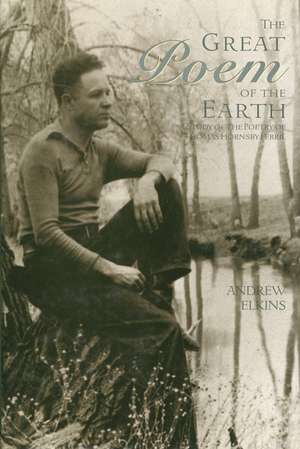The Great Poem of the Earth: A Study of the Poetry of Thomas Hornsby Ferril
Autor Andrew Elkinsen Limba Engleză Hardback – 31 dec 1996
Distributed by the University of Nebraska Press for the University of Idaho Press
Thomas Hornsby Ferril is an important but relatively unknown modern poet. Elkins examines Ferril's entire body of work, including his lesser known verses, in which Ferril comes to terms with war, urbanization, and his mortality.
Preț: 225.46 lei
Nou
Puncte Express: 338
Preț estimativ în valută:
43.14€ • 45.14$ • 35.84£
43.14€ • 45.14$ • 35.84£
Carte indisponibilă temporar
Doresc să fiu notificat când acest titlu va fi disponibil:
Se trimite...
Preluare comenzi: 021 569.72.76
Specificații
ISBN-13: 9780893011963
ISBN-10: 0893011967
Pagini: 230
Ilustrații: photos, index
Dimensiuni: 160 x 236 x 21 mm
Greutate: 0.48 kg
Editura: Caxton Press
ISBN-10: 0893011967
Pagini: 230
Ilustrații: photos, index
Dimensiuni: 160 x 236 x 21 mm
Greutate: 0.48 kg
Editura: Caxton Press
Notă biografică
Andrew Elkins is Professor of English at Chadron State College, Chadron, Nebraska. He is the author of The Poetry of James Wright.
Textul de pe ultima copertă
Andrew Elkins, the author of The Great Poem of the Earth, contends that not only is Ferril the first major poetic voice to emerge in the Rocky Mountain West, but also that his verse can stand alongside, compare favorably with, and complement (through its different vision) the best modern American poetry. At the heart of Ferril's work is a vision of humankind's harmony with the world around it - a vision that distinguishes the poet from most of his modern peers. Ferril approaches nature intending respect rather than domination; he sees no need to think of the human world and nature as essentially separate and opposing realms. A genuine, deeply-felt, mutual, truth-producing, and hope-affirming relationship between the poet and the world in which he lives most clearly characterizes Ferril's work. The world's meaning emerges as one lives in it physically and discovers its plenitude, which includes good and bad, love and hate, life and death. When you establish yourself in the world, as an integral part of the world, then all the world's facts are your facts, related to your being. Elkins examines some of those facts as he explores Ferril's entire body of work, including his lesser-known verses, in which Ferril comes to terms with war, urbanization, and his mortality.
